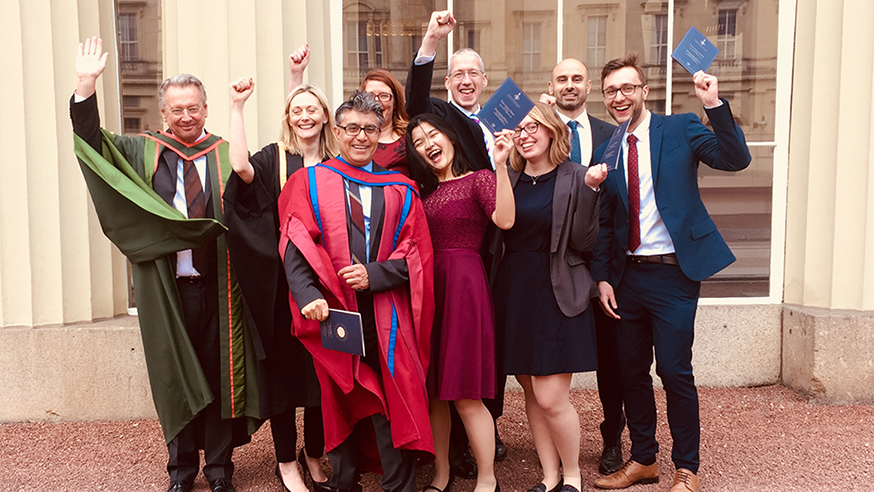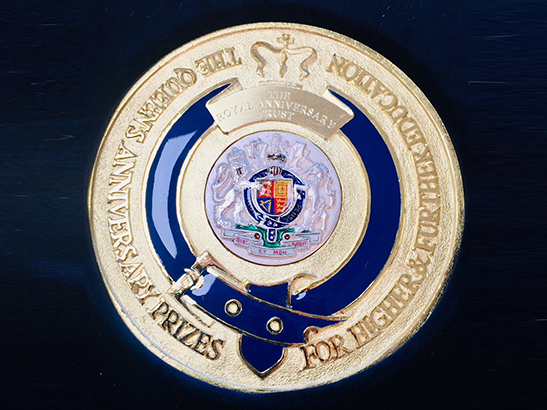
“He was very interested in our work – you could tell from the questions he asked.”
It’s not every day that the heir to the throne takes an interest in your day job. But a team from The Institute of Cancer Research, London, recently got the unusual honour of meeting His Royal Highness The Prince of Wales during the Queen’s Anniversary Prize ceremony at Buckingham Palace.
In recognition of success in drug discovery
In November last year, the ICR was named as one of the winners of the prestigious honour in recognition of the organisation’s outstanding contribution to the discovery of new cancer drugs. Since 2005 the ICR has discovered 20 new targeted cancer drugs and taken 10 into clinical trials.
Jonny Pettinger, a PhD student who was in the team that collected the award, told me: “It was an honour to be asked to represent the ICR. It’s the highest award for UK academic institutions so a real privilege to be recognised.”
Jonny is in his final year of a four-year PhD studentship at the ICR in the Division of Cancer Therapeutics. After a degree in synthetic chemistry at the University of Southampton, Jonny was very keen to come to the ICR.
The benefits of a PhD at the ICR
“There aren’t many other opportunities for a PhD within such an active drug discovery centre that has the kind of facilities we have here at the ICR,” explained Jonny.
“I’ve also had the chance to learn a lot of new techniques because of the multidisciplinary nature of the way we work here.”
And that emphasis on combining expertise from across science has certainly helped the ICR to be such a success in discovery new cancer drugs.
Getting to grips with new techniques
Another PhD student, Catherine Fletcher, who attended the Buckingham Palace ceremony, feels she’s benefited in the same way from going outside her comfort zone.
“My undergrad was in biochemistry but my PhD in structural biology has required knowledge of computational science, for example. I learnt to code in my first year, which required a lot of time commitment. But once I’d got to grips with it, I enjoyed it so much, I’ve taken it even further,” said Catherine.
And computational work does have its advantages over more traditional laboratory science.
“The computer will do what you tell it to do, which isn’t something you always experience when working in the wet lab!”
By studying at the ICR you can become part of the next generation of cancer research leaders.
Making an impact in research
After her degree at Imperial College London, Catherine came to the ICR because she always wanted to work in a translational area of research.
“I was interested in drug discovery and structural biology so this PhD project was very appealing. And I want to make an impact with my work.”
The ICR has had great success in benefiting cancer patients and that has been recognised with the Queen’s Anniversary Prize.
As just one, admittedly spectacular, example – we discovered and developed abiraterone, which is now benefiting hundreds of thousands of men with advanced prostate cancer around the world.
Proud to study at the ICR
“I feel a real sense of pride studying here and the award has just increased that. It was an honour to get to attend the ceremony – as well as a bit surreal,” said Catherine.
Unfortunately not all of the ICR’s PhD students could attend the ceremony – there are around 150 of them. The majority are non-clinical, like Catherine and Jonny, and the rest are clinical – where medical doctors take time out of their clinical training to train as a researcher.
The ICR is committed to educating and training the next generation of researchers and clinicians.
PhDs are so important for creating the scientific leaders of the future. And after their studying finishes, both Jonny and Catherine want to stay in science.
Working in industry
“I plan to work in industry after spending some time as an academic postdoc,” said Jonny. “Although it’s great here, it’s good to move and experience working elsewhere.”
And Catherine has also considered working in industry one day. It might be something about the unique environment within Cancer Therapeutics at the ICR.
“It feels less like academia. Everyone comes together to work on a common problem – people from different specialities,” said Catherine, who appreciates that side of being at the ICR.
That drive to solve problems – to make the discoveries that defeat cancer – runs through the ICR.
Motivated to make a difference
It’s clear that the excitement of winning the award and spending time in the Palace won’t mean the researchers rest on their laurels, as Catherine explained to me:
“I’m not here to celebrate our achievements but to look for the next advance, the next discovery. I don’t think many people are in science for the recognition, although it’s nice.
“We’re here for the love of it and to have a big impact on people’s lives.”
We are training the next generation of researchers; by supporting a PhD studentship, you could help us advance personalised prostate cancer treatment.
